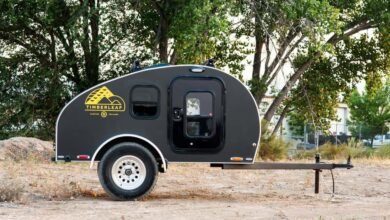Essential Features to Check Before Buying a Dump Truck

When purchasing a dump truck, understanding the critical features that influence performance and efficiency is essential. These heavy-duty vehicles are vital for construction, mining, and other industries that require robust transportation of materials. Considering the powertrain, chassis, operator comfort, and ongoing costs before deciding ensures optimal worksite performance. Buyers should also prioritize safety and technological advances that improve operation and reduce environmental impact. By thoroughly evaluating these key areas, businesses can make informed decisions that lead to increased productivity and reduced downtime. This guide outlines the essential features to check before buying a dump truck, ensuring you choose a machine that fits your specific needs and delivers long-term value.
Performance & Powertrain
A dump truck’s performance is defined by its powertrain. This encompasses the engine, transmission, axles, and their overall durability. A well-suited powertrain ensures the vehicle operates efficiently under different conditions and maximizes productivity on the job site.
Engine Power and Rated Capacity
Selecting the right engine power is crucial. It determines the truck’s ability to haul heavy loads across various terrains. Higher horsepower ensures the truck can handle intense work demands and challenging environments. Rated capacity is another key factor. It indicates the weight the truck can safely carry. When assessing these elements, consider the typical load weights and operating conditions of your worksite. A truck with inadequate power or capacity can result in increased wear and tear, resulting in higher maintenance costs. Performance efficiency is not just about power but matching the vehicle’s capabilities with the task at hand.
Transmission, Axles, and Durability
The choice between automatic and manual transmission significantly impacts performance. Automatic transmissions offer easier operability in stop-and-go scenarios, while manuals provide more control. The strength and type of axles are vital for load-bearing and terrain adaptation, particularly in uneven or rugged environments where added durability is a must. Additionally, high-quality materials and build processes contribute to the overall durability of the transmission and axle system, reducing the likelihood of breakdowns. These components must be robust enough to withstand daily operational stresses, ensuring longevity and minimizing downtime.
See also: Navigating Private Cloud Providers for Optimal Business Performance
Chassis, Body & Worksite Adaptation
A dump truck’s adaptability to worksite conditions is largely determined by the chassis and body design. These elements should harmonize to enhance performance and ensure compatibility with specific job demands.
Chassis Strength
Chassis strength is a measure of a dump truck’s durability and ability to support heavy loads. Its design should accommodate the tough conditions typical of construction and mining locations. Reinforced materials, such as high-tensile steel, provide necessary resilience. Choosing a truck with a solid undercarriage minimizes the risk of structural failures. This investment upfront avoids costly repairs and operational delays, facilitating smoother project completion. Consider the worksite’s daily challenges and select a chassis that aligns with those requirements for maximum efficiency and safety.
Cargo Box Design and Tailgate Options
The design of the cargo box and the type of tailgate can influence operational efficiency. A well-designed cargo box facilitates easy loading and unloading, minimizing time and effort. Examine customization options like shape, size, and material to ensure it suitably matches your material type and volume. Tailgate choices, including automatic and manual systems, impact the control and safety of offloading materials. Features like hydraulic tailgates can significantly enhance precision and safety when unloading. Selecting options that align with your operational needs leads to smoother workflows and reduced labor costs.

Operator Comfort, Safety & Technology
Modern dump trucks should provide comfort and incorporate advanced technology to enhance productivity while ensuring operator safety. Ergonomic design and up-to-date systems play pivotal roles in achieving this balance.
Cab Ergonomics and Controls
A well-designed cab enhances operational comfort and productivity. Ergonomically placed controls reduce strain on operators, which is especially important during extended hours of operation. Consider features like adjustable seating, user-friendly dashboards, and climate control systems. These elements contribute to reduced operator fatigue and improved focus. A comfortable cab ensures the operator can perform tasks efficiently, enhancing overall job site productivity. When evaluating dump trucks, prioritize models that offer an intuitive design and support long-term operational comfort.
Safety Systems and Eco-Options
Safety features protect operators and enhance job site security. Advanced braking systems, stability control, and collision warning systems are crucial. Many modern dump trucks now include eco-options, such as fuel-efficient technologies and emissions control systems, to reduce environmental impact. Evaluating safety and ecological systems contributes to comprehensive operational assurance. These features not only protect the workforce but also align with increasingly stringent environmental regulations. By investing in trucks equipped with robust safety and eco-features, businesses demonstrate their commitment to sustainable and responsible operations.
Support, Parts & Total Cost of Ownership
Consider ongoing support and the availability of parts when purchasing a dump truck. Reliable manufacturer support and easy access to parts reduce downtime. Evaluate the total cost of ownership (TCO), which includes purchase price, maintenance expenses, fuel consumption, and resale value. A truck may appear cost-effective initially, but could incur high operational costs. Opt for models with a balanced TCO to maximize investment returns. Working with manufacturers or dealers who offer comprehensive service plans further ensures preparedness for maintenance needs. By understanding TCO, you ensure long-term financial viability and operational efficiency.
Conclusion
Choosing the right dump truck involves assessing various features to match operational needs with performance and efficiency. Critical considerations include powertrain capabilities, chassis strength, operator comfort, and TCO. Selecting a truck that aligns with your worksite demands ensures reliability and productivity. By focusing on durability, advanced safety, and technology, organizations can optimize their investment for long-term gains. With careful selection, a dump truck can be a powerful asset, driving project success and sustainability. Emphasize these features to make an informed decision that supports your company’s operational and financial goals.





